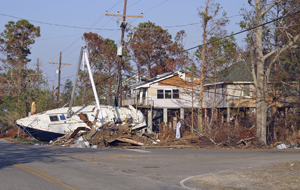 How many times have you received your policy renewal, only to pay the premium and then file it with your important papers? Each time you receive a new insurance Declarations page (the first page of your policy), you should carefully review it for important information about your policy, the policy deductible and any other deductibles added by endorsements. The best time to review this information isn’t when you have a claim, but rather before disaster strikes. Taking some time to understand how your deductible works will prevent unpleasant and unexpected financial surprises.
How many times have you received your policy renewal, only to pay the premium and then file it with your important papers? Each time you receive a new insurance Declarations page (the first page of your policy), you should carefully review it for important information about your policy, the policy deductible and any other deductibles added by endorsements. The best time to review this information isn’t when you have a claim, but rather before disaster strikes. Taking some time to understand how your deductible works will prevent unpleasant and unexpected financial surprises.
What is a Deductible?
A deductible is the amount of money that is deducted from a claim payment you receive for a covered loss to the insured property. The deductible is a vital element of the insurance contract and represents a shared risk between the insurance company and the policyholder. Deductibles shift the cost of small claims, those that are less than the deductible, to the policyholder. This encourages policyholders to prevent losses through routine home maintenance. Loss prevention benefits both the insured and the insurer by keeping claims costs down. Most policyholders have a flat deductible that applies to all covered losses for property damage. Generally speaking, raising the deductible can result in a premium reduction.
In addition to the flat deductible, homeowners who live near the coast will also have either a Wind or Hail Percentage Deductible (EN312) or a Named Storm Deductible (EN313), unless wind coverage has been excluded from the Farm Bureau Insurance® policy. These deductibles are added to the policy as endorsements and apply to losses caused by wind or hail. For property located inland, a Wind or Hail Percentage Deductible may be required based on the age and condition of the roof.
The Wind or Hail Percentage Deductible applies to all losses caused by wind or hail. Percentage deductible options include 1%, 2%, 3%, 4%, 5% and 10%. The percentage deductible is calculated by multiplying the percentage by each coverage amount for Coverage A (dwelling), Coverage B (other structures) and Coverage C (personal property). Since the amounts for each of these coverages vary, the deductible will also vary for each (A, B and C). Once the percentage deductible is calculated for each coverage, it must be compared to the minimum and maximum deductible amounts required for each coverage. The minimum and maximum deductible amounts can be found on the homeowner endorsement schedule enclosed with each new Declarations page.
For Example
A policy with a 2% wind percentage deductible requires a minimum of $500 deductible per coverage. The maximum deductible per coverage is set at $20,000. If the policy provides $100,000 of Coverage A, the percentage deductible for this coverage would be $2,000 ($100,000 x .02). Since $2,000 is greater than the required minimum deductible of $500, the deductible would stand at $2,000.
If the policy includes $10,000 for other structures (Coverage B), the percentage deductible for Coverage B would be calculated as $200 ($10,000 x .02). However, $200 is less than the required minimum deductible of $500. For a Coverage B loss, the deductible would then be set at $500.
For policies that have a Named Storm Wind Deductible (EN313), this deductible only applies to wind and hail losses caused by a named storm. A named storm is a tropical storm or hurricane named by the National Weather Service. The deductible is calculated as a percentage of Coverage A and applies to covered losses under Coverage A, B or C. Deductible options for the Named Storm Deductible include 1%, 2%, 3%, 4%, 5% and 10%.
What does your homeowner's insurance cover?
Most of our South Carolina homeowner's insurance policies contain similar basic coverage options, but the amount and specifics of the coverage can vary by the type of policy you have. Coverage options include protection for your private residence, other buildings on your property, and personal property inside your home.
Remember, flood and earthquake losses are not covered by your homeowner’s policy. Ask your agent about purchasing a separate flood policy available through the National Flood Insurance Program. Flood policies have a separate deductible. Earthquake coverage can be purchased as an endorsement to your homeowner’s policy. A separate deductible also applies to earthquake coverage.
You don’t have to sort out your deductible options on your own. Give your Farm Bureau Insurance agent a call to review all of your policies to ensure you understand the coverage provided and the required deductibles.
How to Establish a Catastrophe Savings Account
Catastrophe savings accounts can help you pay for your deductible and other out-of-pocket costs. Similar to health savings accounts, the money can be set aside state income tax-free and used in the future to pay for qualified catastrophe expenses that result from a hurricane, flood or windstorm event that has been declared an emergency by the governor. Find out more about catastrophe savings accounts..